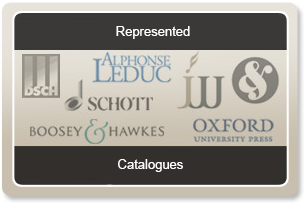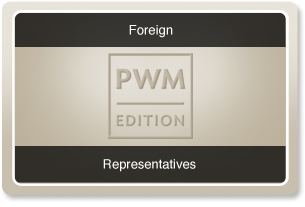News
"I treat film as a private challenge" – a conversation with Michał Lorenc
2015-03-20
Maciej Łukasz Gołębiowski talks to Michał Lorenc who has just started his cooperation with PWM Edition.
How did it happen that you became a member of the group of artists represented by PWM Edition?
The editor in chief called me and proposed publishing some of my scores. I was really shocked. I treat writing film music as creating sound tissue which is to be inscribed in image to make its background or to complement it. I have never considered it to be a separate concert oeuvre. And now PWM Edition wants to publish that music in the way Penderecki is published. I would never expect it and therefore I feel deeply honoured.
We can read in your CV that you started your adventure with music as a 15-year old, in a student tent base in the Bieszczady Mountains, where you met Belon, Kleyff and Bielecki. Do you ever come back there, in the mountains?
Yes, I do, and each of these visits is different and unique. Although the names of the towns are the same, I get an impression that everything has changed. You cannot compare the reality there to the matrix of memories in my head that I first created nearly 50 years ago. But music came much earlier in my life. As a boy from a good Warsaw home, I had piano lessons already at an early stage. Music drew me in. I started composing my first melodies when I was 10-12 years old. Then those melodies started to lead their own lives thanks to my friends, mountain guides, and wandered along the tracks long before me.
Could we say then that you are a composer by vocation rather than by education?
I do not at all feel like a composer. I can't compose. I am just a melody writer. Something comes to my mind and I try to use it to build more. However, I am only able to do it when I see the image, the film. The film and emotions it carries, its theme and script are not a limitation for me, but rather a necessary inspiration and determination of the frame in which I am to move. I am like Leonard Zelig from Woody Allen's film. I have never written other music than film music. I can't. I wouldn't dare.
You had a chance to work in the American Dream Factory. What impressions did you bring back with you?
A person speaking English called me and said he was Bob Rafelson. I know his films by heart, so I thought it was a joke and asked him to call me back later. At least in an hour. I asked Cezary Harasimowicz, a regular Hollywood visitor, to help me resolve that kind of joke. He came, the telephone rang again, and it was only after I saw the solemn face of Cezary holding a second receiver that I realised it was not a joke. Rafelson said I had a flight ticket booked in three days, a limousine and a hotel... And so I landed up in California. Rafelson represented a passing generation of directors. Working with him on Blood and Wine meant long hours of talking every day and arranging details together. It was a real partnership for the sake of creating something unique together. Then I wrote music to one more film in Hollywood and could experience working with a new generation of American film producers. They would come and show me the music they liked and would require me to write the same but in a different way. In the meantime, I was invited to work on Poznań’56 and shortly after on Bastard. I came back to Poland and the circumstances made me stay here. I don't regret.
What is film music like nowadays?
It is a genre that is constantly changing and, just like everything else, undergoes trends and passing fashions. Once those fashions would not last long. Now, in the era of the Internet, when new directions are spreading rapidly and the aggressiveness of the market is increasing, the role of music and the position of the composer in film have degraded. Beside five "hot" names, the composer is a service provider who is required to possess craft skills. Everybody writes in a similar way. I get an impression that we are far behind unforgettable musical experiences in film. Film masterpieces from the past, which were full of sophisticated artistry, are not interesting for a modern viewer prompted to continuously exercise his experiences by unexpected action turns, fast montage and narration speed. Today Antonioni would not have an opportunity to dazzle with The Adventure.
And your style?
Adjusting to the spirit of new times is not my forte, but, unfortunately, I have always liked showing off. The desire to play a part in film pushes you to writing a strong theme or to direct the film threads in such a way as to tell your own, second story with your music, which can give the image another dimension. I begin treating film as something that is my own, personal experience. As a private challenge. When I understood that music in film had all the characteristics of audience manipulation, and the composer was supposed to be absolutely loyal to the theme of the film, the servile approach started to be much more difficult for me. When I was young, arrogant and self-confident, playing Zelig was really easy. With time, understanding the value of music took away my cheek and ease of writing. To compose for the orchestra, you need to have skills, knowledge and understanding, also of people who are to play what you have painstakingly created at home. If I were to write to the script of 300 Miles to Heaven today, I'm afraid that I might not be ready to face it. I want to expect too much of myself, but, in fact, I know too little to meet these expectations.
How do you work on your music?
In the past you would write film music step by step, bar by bar, synchronously to image. While writing bar 24, you never knew what awaited you in bar 28. It brought interesting themes that were often really fascinating. Now, just like a great majority of film musicians, I work on my computer. You can see and hear everything, and it is simple, easy and comfortable. The times of improvised themes and astonishing music incidents in film are gone. Film is a very young area of communication, that is increasingly driven into strict codes of rules and discipline. Would I now have the power and courage to write music to Pasikowski's Pigs, if it was blatantly inspired by works of Charles Ives at that time? I don't know.
You are turning 60 this year. Such an anniversary is always a good time to reflect. Are you happy?
Looking back, I have an impression that I got from life more than I could have expected. I'm not only speaking about music, but about people whom I met, about my children, grandchildren or even my dog that I walk each day in the woods. It all adds to my personal happiness and keeps me strong every day. I can only be thankful.
fot. Waldemar Kielichowski











